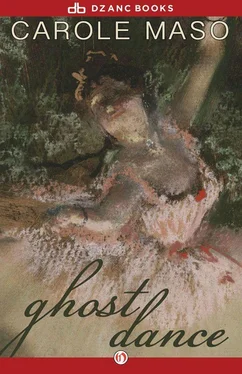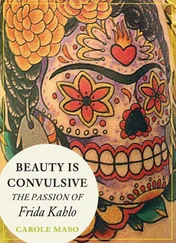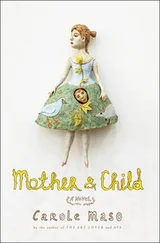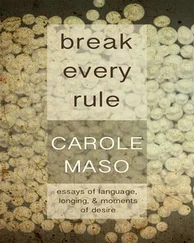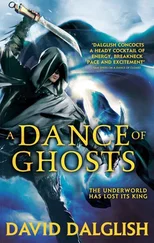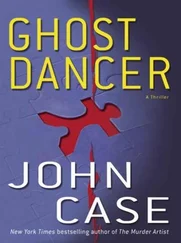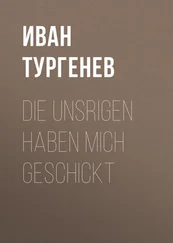I am surprised to hear the voice she has when she finally speaks. I expected it to be dreamlike and soupy, but it is not. It is as if she is someone else entirely, not my mother but the woman who gives interviews, the woman who has written six books, the one who gives readings. Her voice is strong, bell-like on a clear day.
I could easily touch my mother, but I do not want to frighten her away or make her feel as if she’s trapped. I do not want her to misconstrue the situation or to think that I am changing.
Though I have made no move, she seems to back away, and I feel as if I have taken such care to keep her next to me that I begin to cry. Why must she always be leaving? Her face is pained. Why must she suffer so much?
My mother looks at me as if she sees some weakness of hers in my face and grows fierce.
“No one,” she says coldly, putting her hands on my shoulders, “should feel sorry for me. I’ve had a very good life, Vanessa,” she whispers. “Do you understand what I’m saying? I’m a very lucky person,” she says slowly. “I wouldn’t have wanted it any different. No one should feel sorry for me. People read what I write. Don’t cry for me, Vanessa. Don’t you dare cry for me.”
She sits back as if she is getting ready to tell a long story. She brushes the hair from my neck.
“Sometimes, you know, when I have just finished a poem or have gotten a glimpse of another, made some connection I’ve never made before, felt some wholeness that has eluded me and everything falls into place, I think to myself I must be the luckiest, the happiest person in the whole world. It’s important for you to know. It’s true. I’d never lie to you.” She kisses me, hugs me, rocking me in her arms. “Oh, Vanessa, don’t you cry for me.”
“No crying now, Marta.” I bend down to her. Her face is in the pillow. I touch her curly head, its unspeakable darkness. “You’ll feel better after this,” I say. We have run out of drugs. Everything about the world bruises us — its color, its shape, its sound. It is painful for her even to move. Still she turns to me, ever hopeful.
“Come on,” I say, helping her up. She is an old woman, I think. Her foot steps are loud as we walk down the hall. I lead her into the curving w hite room. “Here now. Sit down, Marta,” I say, placing her on the edge of the bathtub and slowly undressing her. The old woman turns into a child. She looks up at me with large brown eyes, all hope, as I run hot water into the sink. She is hunched over. She says nothing, rubs her eyes. Is her head still in the pillow? Is the walk down the dark hallway, the warm water in a sink, my hands that skim the top, is it all a dream? I empty what looks to be green sand into a jar and add warm water. We are little girls playing in mud, in clay. She does not take her eyes from my hands. Her eyes are dark — almost black — beautiful, her long eyelashes, her thick eyebrows. I watch her as I mix the paste in a jar.
“It‘s the magic of plants,” I say.
She shakes her head no in some disbelief.
“Yes,” I whisper. “It’s henna. It will make your hair beautiful, silky, soft.”
She smiles slightly. She can’t help being a little amused. She has been awakened for this, she says, forced down the cold hallway into this cold room for this?
“That’s right,” I say.
“An appointment at the beauty parlor? Jesus, Vanessa — the magic of plants — what’s wrong with you?”
“I’m not kidding,” I say. “You’ll feel better.”
I put on a pair of rubber gloves. She just stares.
“This is some outfit,” she says. I am standing in my underwear, rubber gloves on up to my elbows.
“Shh,” I say, dipping my hand into the warm glass jar, the warm paste of plants. I smooth it on, beginning at the roots and gradually working down.
“I like this,” she smiles. “This isn’t as bad as I thought.”
I rub the henna into her hair. I feel the bones of her skull, the line of her neck. I touch her lovely curving back. I cradle her head, feel its bumps. I find my mind drifting. I find myself thinking that I would like to hold this head forever. I work more diligently.
“This feels good,” she says. “Do I get a mud pack next?”
“I wonder how you’ll look as a redhead,” I say.
“What?”
“Well, will I like you as a redhead? Want to hear a redhead’s stories? Want to sing Billie Holiday songs with one? You know.”
“You’d better not make me a redhead.”
“Didn’t they have I Love Lucy in Venezuela?”
She grins.
“Lucy, Lucy!” I say.
“Yes, Ricky?” she shouts and then does Ricky’s part, too, in the Spanish I love to hear.
She becomes weary, bone-tired, suddenly. “Don’t make me a redhead,” she says sternly.
“Don’t worry. We won’t leave it in long.”
Her head is nearly completely covered now. The smell of henna fills the bathroom. It smells of luck to me, of long life.
“Shall we henna this?” she says, touching the fine hair under my arms. She laughs. “Let me have those gloves.” I submerge them in water. She takes them off my hands and puts them on.
“Will I like a redhead?” she asks as she puts her hand into the jar. “This stuff feels good,” she says. Delicately she applies the paste to each tiny hair, and the plant warmth radiates through my body.
“I think I will like a redhead,” she says.
“It tickles,” I say.
“It’s not working if it doesn’t tickle,” she says. I step back for a second.
We are so at ease with each other at this moment, so happy, so much ourselves here, green everywhere, so natural, that we almost forget that this all must be strictly timed, that we must watch the clock, that it cannot go on forever.
She turns to me abruptly as if she can read my thoughts. Her hands are covered with henna. I’m turning away from her when she grabs my arm, leaving her large handprint. Her eyes are black and fierce. Her hair is plastered to her head, a warrior’s ancient helmet. She’s hurting me. “Don’t make me love you,” she says bitterly. “Vanessa, please — don’t make me love you,” she begs.
On the train home, on the way to the last Christmas in that string of Christmases, where was the sign, the clue? The impossible blizzard, the closed road, the red bird in the snow, the man in the black coat? Where was the symbol that in its perfection would have told us to prolong our gazes, extend our thank-yous, hold our embraces a moment longer?
We were all students on that train, it seemed — exhausted students, silly students, students in love — nothing unusual, and as the train pulled out of Poughkeepsie and followed the frozen Hudson toward New York, some talked of the exams which in their minds they were still taking, again and again, perfecting each answer. Others slept. Some must have dreamt of home. I was thinking of Marta who was Hying now into a different winter. Henna still stained my hands and arms. I had made no attempt to get it off. It would be a month’s separation.
Snow had begun to fall. The snow wrapped around the old train like the wings of an angel, and my thoughts shifted to my mother. I was flying headlong through the December night into her favorite season. It was the only time of year when she could lift herself out of the pull of her work and become for a month someone quite different. Some star rose up in her, a perfect, luminous shape, and she seemed to us intensely happy as she shopped and baked and wrapped presents and mailed cards. We had seen it many times now. Each year my father would follow her around asking her not to push herself so hard, begging her to rest, reminding her how easily she tired. December was almost always followed by a January filled with misgivings, depression, lack of focus, lack of feeling sometimes — sometimes worse. She never listened to my father. “It’s Christmas!” she would say, as if that explained everything, and she would continue her frenzied preparation. “Shoo!” she’d say to my father as he persisted. “Shoo, Michael.” These words always bothered me, the way she batted him away, the way she wiped her brow, though it has taken me a long time to figure out why.
Читать дальше
